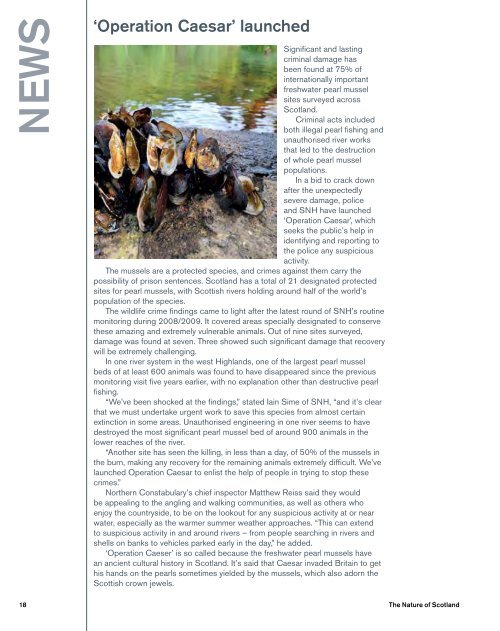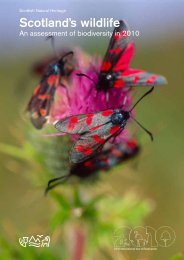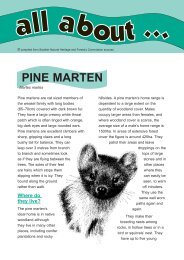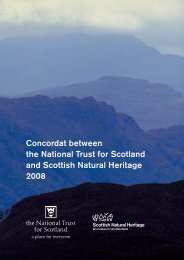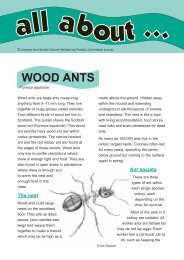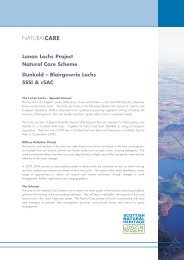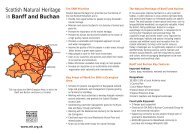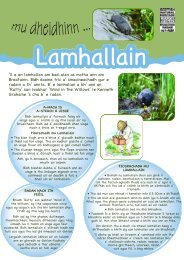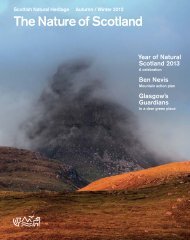You also want an ePaper? Increase the reach of your titles
YUMPU automatically turns print PDFs into web optimized ePapers that Google loves.
NEWS<br />
‘Operation Caesar’ launched<br />
Significant and lasting<br />
criminal damage has<br />
been found at 75% <strong>of</strong><br />
internationally important<br />
freshwater pearl mussel<br />
sites surveyed across<br />
<strong>Scotland</strong>.<br />
Criminal acts included<br />
both illegal pearl fishing and<br />
unauthorised river works<br />
that led to the destruction<br />
<strong>of</strong> whole pearl mussel<br />
populations.<br />
In a bid to crack down<br />
after the unexpectedly<br />
severe damage, police<br />
and SNH have launched<br />
‘Operation Caesar’, which<br />
seeks the public’s help in<br />
identifying and reporting to<br />
the police any suspicious<br />
activity.<br />
<strong>The</strong> mussels are a protected species, and crimes against them carry the<br />
possibility <strong>of</strong> prison sentences. <strong>Scotland</strong> has a total <strong>of</strong> 21 designated protected<br />
sites for pearl mussels, with Scottish rivers holding around half <strong>of</strong> the world’s<br />
population <strong>of</strong> the species.<br />
<strong>The</strong> wildlife crime findings came to light after the latest round <strong>of</strong> SNH’s routine<br />
monitoring during 2008/2009. It covered areas specially designated to conserve<br />
these amazing and extremely vulnerable animals. Out <strong>of</strong> nine sites surveyed,<br />
damage was found at seven. Three showed such significant damage that recovery<br />
will be extremely challenging.<br />
In one river system in the west Highlands, one <strong>of</strong> the largest pearl mussel<br />
beds <strong>of</strong> at least 600 animals was found to have disappeared since the previous<br />
monitoring visit five years earlier, with no explanation other than destructive pearl<br />
fishing.<br />
“We’ve been shocked at the findings,” stated Iain Sime <strong>of</strong> SNH, “and it’s clear<br />
that we must undertake urgent work to save this species from almost certain<br />
extinction in some areas. Unauthorised engineering in one river seems to have<br />
destroyed the most significant pearl mussel bed <strong>of</strong> around 900 animals in the<br />
lower reaches <strong>of</strong> the river.<br />
“Another site has seen the killing, in less than a day, <strong>of</strong> 50% <strong>of</strong> the mussels in<br />
the burn, making any recovery for the remaining animals extremely difficult. We’ve<br />
launched Operation Caesar to enlist the help <strong>of</strong> people in trying to stop these<br />
crimes.”<br />
Northern Constabulary’s chief inspector Matthew Reiss said they would<br />
be appealing to the angling and walking communities, as well as others who<br />
enjoy the countryside, to be on the lookout for any suspicious activity at or near<br />
water, especially as the warmer summer weather approaches. “This can extend<br />
to suspicious activity in and around rivers – from people searching in rivers and<br />
shells on banks to vehicles parked early in the day,” he added.<br />
‘Operation Caeser’ is so called because the freshwater pearl mussels have<br />
an ancient cultural history in <strong>Scotland</strong>. It’s said that Caesar invaded Britain to get<br />
his hands on the pearls sometimes yielded by the mussels, which also adorn the<br />
Scottish crown jewels.<br />
18<br />
<strong>The</strong> <strong>Nature</strong> <strong>of</strong> <strong>Scotland</strong>


